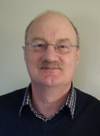Allan Hewitt (New Zealand)

Age: Mature, active, moderately weathered, partly eluviated, 0.06ka
Address: Landcare Research PO Box 40 , Lincoln , New Zealand
E-mail:
Position: Research Leader
1. When did you decide to study soil science?
Childhood curiosity about a brilliant red-coloured road cutting near my family farm made me aware of earth materials. I completed undergraduate study in chemistry and geology and worked as an exploration geologist, sampling soils for copper and tungsten content. I realized that I was more interested in the soils themselves than just the metal contents of the samples. Thoughts for the future harked back to that cutting. I had to know more about what that was. The threads of curiosity and accumulating knowledge all came together when I studied soil science, in a post-grad diploma, at Lincoln University , NZ. There was a feeling of homecoming.
2. Who has been your most influential teacher?
I have been fortunate to have several enthusiastic teachers. Two that stand out are Prof's Armand Van Wambeke, and Marlin Cline, of Cornel U who gave the vital ingredient of one-on-one discussion which imparted and sharpened. Like others who have been a great influence, these two taught from the authority of long experience. Various supervisors and colleagues in my work have also been inspiring teachers.
3. What do you find most exciting about soil science?
The greatest excitement for me is to understand how a landscape works, and to capture some expression of its orderliness. The exploration of planet earth is not complete, and in 2010 we can still discover, characterize, and name new soils. We can take part in fundamental discovery armed with just a spade and auger. It is a unique experience to arrive in a fresh landscape and gather clues about its genesis, and patterns of soils, and then to extend that understanding to make inferences about its management potential and risks. Another buzz for me is to work closely as part of a project team where great ideas arise out of group interactions. This is only too rare and needs to be nurtured.
4. How would you stimulate teenagers and young graduates to study soil science?
This question is relates back to question 1. If we were to survey 'why we studied soil science' for a large sample of soil scientists we may discover some common paths that might be used or adapted.
Because my path was curiosity, then I would naturally wish to stimulate curiosity in the young. For the very young it would be to dig and delve to search for the curious. For older more aware students the hook would be landscapes to discover the natural order and think about why, how, and its significance for people. The mystery needs to be posed then unveiled by observation. Wouldn't it be marvelous if the power of the gaming industry could be harnessed to pose the mystery. The technology is available to produce dynamic 4D visualizations of how landscapes evolve and work, at multiple scales. Enthusiasm is best caught from people but gaming media could stimulate the initial curiosity.
Deep thought needs to be given to identifying what is cool about soils! Biologists have the cute and cuddly; geologists have dinosaurs and volcanoes. What does soil science have? Pin-up soils? Soil art is a start but needs to reach a larger audience. Soil science needs to engage the advertising industry. Give them a break, provide for them something really good to promote.
5. How do you see the future of soil science?
If humans enjoy a good future on earth then part of the reason will be because they have gained a new regard for the underpinning soil. The future of soil science is tied to the future of people on this crowded planet. Imagine a world where people understand soil not just the specialists but the public, officials, and businesses. Soil is popular. 'Dirt' is no longer a synonym for unhealthy. The idea of soil as natural capital becomes embedded in the public and economic mind. Land use is configured to take best advantage of this natural capital, and all the soil services it supports are monitored and managed, not just the economically convenient ones. Intergenerational equity is a working principle and we understand resilience and how to manage it. Capital withdrawals from the soil are rebuilt where possible by recycled waste streams. Less of the earth's resources are devoted to frippery and more to substance.
We must communicate our ideas in new ways far beyond our inner circles. They may be idealistic but without something to aim for we are destined to just hug the bottom line of expediency.




